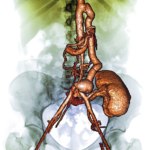A small study shows baricitinib effectively treats refractory Takayasu arteritis & allows for glucocorticoid reduction with no serious adverse events recorded.


Katie Robinson |
A small study shows baricitinib effectively treats refractory Takayasu arteritis & allows for glucocorticoid reduction with no serious adverse events recorded.

Bryn Nelson, PhD |
Despite anecdotal reports to the contrary, a large observational study concludes that TNF inhibitors, compared with non-TNF biological or targeted synthetic DMARDs, do not cause higher rates of death or respiratory hospitalization in patients with RA-ILD.
In this study, researchers set out to determine the prevalence of baseline risk factors for cardiovascular outcomes and cancer among commercially insured patients with rheumatoid arthritis during their first dispensed treatment.

Research from Choi et al. provides insights into the risk of infection in patients with rheumatoid arthritis (RA), comparing patients treated with Janus kinase inhibitors vs. tumor necrosis inhibitors. The most frequent infection was herpes zoster, with patients treated with JAK inhibitors having a significantly greater risk of herpes zoster infection than those treated with TNF inhibitors.

Research by Chicre et al. found that Janus kinase inhibitors may significantly increase the risk of major adverse cardiac events and all-cause death in patients with rheumatoid arthritis (RA) when compared with other RA treatments. This study highlights the need for more comparative safety studies.

A study examined the association between TNF inhibitors and neurological demyelinating adverse events in patients with rheumatoid arthritis and spondyloarthritis using cohort data from five Nordic countries. Researchers showed that patients with SpA were more likely to experience adverse events than patients with RA.

Katie Robinson |
Findings support the continued use of TNF inhibitor monotherapy in individuals with immune-mediated inflammatory diseases. In the study, these patients had a lower risk of hospitalization or death caused by COVID-19 than patients on other commonly prescribed treatment regimens

Cleveland Clinic Foundation Rheumatology Fellowship Program: Saja Almaaitah, MD; Shashank Cheemalavagu, MD; Rupal Shastri, MD; Perry Fuchs, MD; Melany Gonzalez Orta, MD; & James Vondenberg, DO |
As the capabilities of machine learning and artificial intelligence improve, rheumatologists have access to more data than ever, which may enable them to better predict which patients will respond to specific treatments, such as tumor necrosis factor inhibitors.

Ghalandari et al. sought to validate the guidance outlined by EULAR for the use of anti-rheumatic drugs during pregnancy, finding that following its guidance for tumor necrosis factor inhibitors led to no or low concentrations of these agents in cord blood.

Larry Beresford |
An observational study found treatment with tofacitinib resulted in only a slightly higher rate of venous thromboembolism than tumor necrosis factor inhibitors in patients with rheumatoid arthritis.